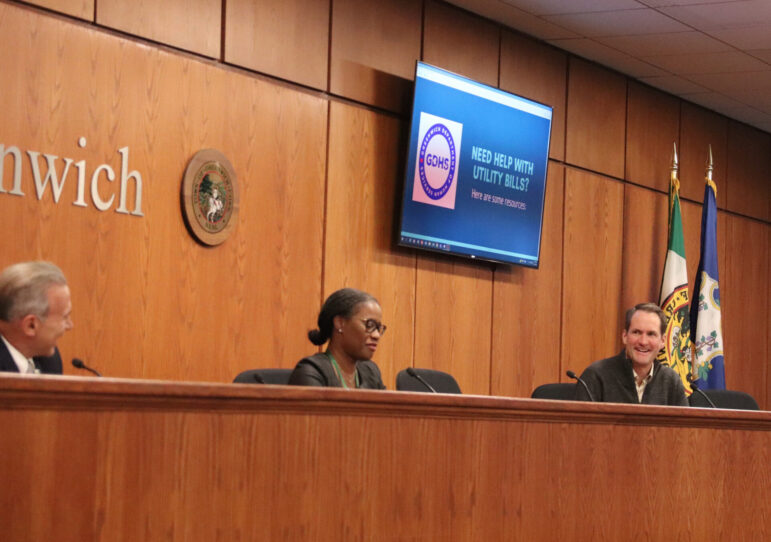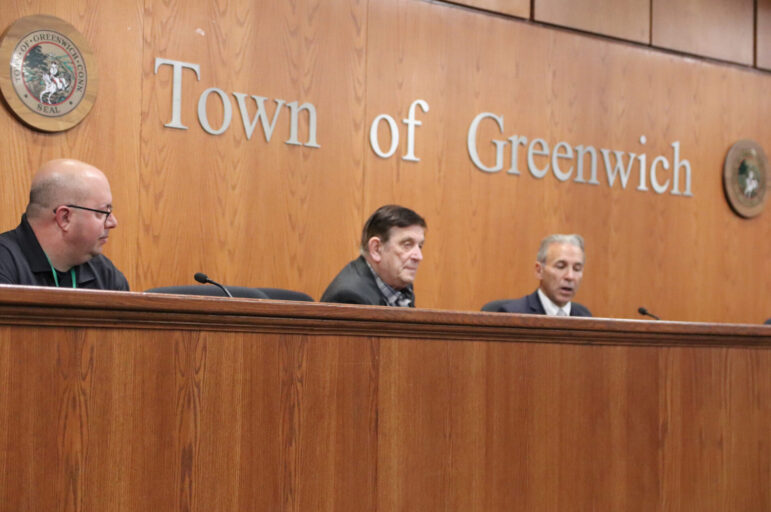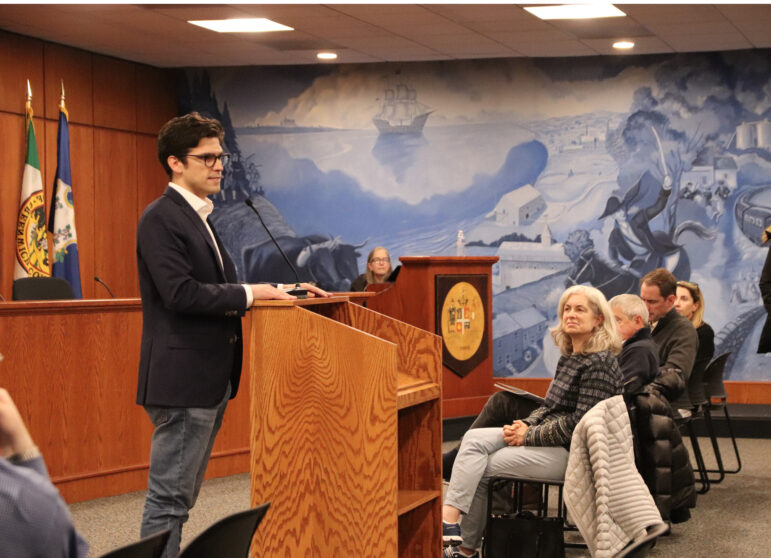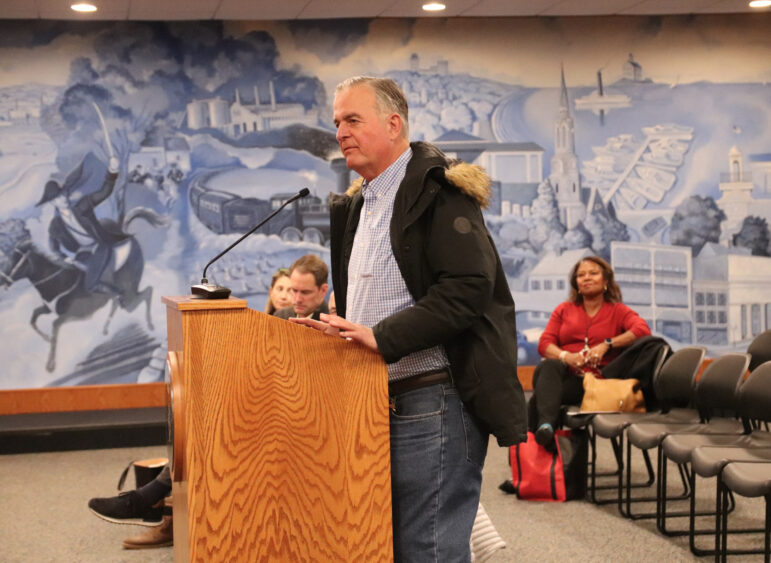As residents anticipate record high energy costs this winter, a forum organized by First Selectman Fred Camillo on Wednesday highlighted assistance programs.
A week earlier, Eversource announced that on average, a residential electric customer could see an increase of approximately 48% over their current monthly bill, or approximately $85 per month.
At Wednesday’s forum, Camillo said he wanted to make sure Greenwich residents, especially people on fixed incomes, were aware of every possible option for assistance.
The panel featured Greenwich Communities Chairman Sam Romeo, Emergency Management Director Joseph Laucella, Dept of Human Services Director Demetria Nelson and US Congressman Jim Himes (D-4).

Demetria Nelson, the Director of Human Services can help residents complete applications for assistance. She shared a list of programs and services (*All links are embedded below).
“You can apply directly for these services, but if you need assistance you may call, email or come to the Greenwich Dept of Human Services on the third floor of Greenwich Town Hall and an intake case manager will assist you in applying for these services,” Nelson said, adding that residents struggling to pay their utility bills likely have other areas where they need assistance.
“Please reach out to us to explore what services you may be eligible for,” she said. “We’re working on developing our ARPA American Rescue Plan Act-related program for families and residents whose income may be slightly higher than what some of these programs will allow for.”
Through the ARPA program, Nelson said her department will provide assistance not only with utilities, but also with rent assistance for households at the ALICE (Asset Limited, Income Constrained, Employed) threshold or below. For example, a family of four would qualify at an income of $114,000 or less.
Congressman Jim Himes said the ARPA funding comes through a federal program called the Low Income Home Energy Assistance Program (LIHEAP). Go to CT.gov/heatinghelp to make an online application.
“It’s important people understand it is income related,” Himes said. “Basically for a one-person household – an individual or a senior citizen living alone – the income eligibility starts at $39,700. For a four-person household, that goes as high as $76,500.”
“There’s going to be a lot of people out there who are eligible for this, especially our senior citizens,” he said. “The benefit is income related, but can be as high $550 or $600.”
Himes said the Weatherization Assistance Program, with federal funds, is intermediated by community action agencies, with the goal of making homes more energy efficient. This program, using the same income qualifiers, provides free energy audits and identifies things like windows that need new caulking, and areas where heat is bleeding out of a house. Also, it has money to help with things like insulation, duct sealing, HVAC system repairs.
“I get it,” he said. “When you’re worried about this month’s bill you might not be thinking about that, but this is a really important program because if people take advantage of it, it will reduce the energy expenditures.”

Also, Himes said the Inflation Reduction Act includes about $5 billion for states to establish programs creating tax benefits for people who invest in energy efficient appliances. “Things like heat pumps, water heaters.”
“They’re actually quite generous benefits,” Himes said. “For example, if you replace a cook top that is inefficient, you can get up to a $900 tax benefit. Space heating and cooling – efficient equipment there can be as much as an $8,000 tax benefit. These are all credits that can be put toward your tax liability.”
“I encourage everybody to watch this space because there are going to be very substantial tax benefits available for people to make the investments to make their homes cheaper to heat and cool,” Himes continued.
The Congressman said it was very important for people who think they don’t make enough money to have to file a tax return do so anyway because the benefits he outlined will be credits toward tax liability.
He gave two examples where not filing a tax return is a mistake. First he said, a lot of people will qualify for the Earned Income Tax Credit. In particular, if an individual has low wages, but has children, a credit of up to about $5,000 is possible. The other reason that the energy benefits that are part of the Inflation Reduction Act will be delivered toward their tax liability.
Sam Romeo, chair of Greenwich Communities (formerly the Housing Authority of the Town of Greenwich) said he was especially concerned about residents in public housing who heat their apartments solely through electricity. He said that was the case at McKinney Terrace in Byram.
Romeo said his residents are also worried about costs of oil and gas, as well as increased cost of food due to inflation.
“We’re trying to find all sorts of ways to assist them to put food on the table, gas in their cars and keep them warm through this winter,” he said. “These are the people who can least afford to take on these increased costs.”
State Senator Ryan Fazio (R-36) said at upcoming special legislative session would most likely extend the gas tax holiday – a 25¢ gas holiday several months.
“It will probably phase out 5¢ a month over the course of several months,” he said. “And also extending the LIHEAP) program.”


State Rep Meskers (D-150) said that residents should cc their elected representatives on their correspondence with agencies when seeking assistance.
“We will move the ticket along in getting a solution,” Meskers said. “They respond a little quicker sometimes if we are the cc on the emails,” he said.
“The cost of natural gas, the cost of liquid natural gas is going through the roof, the cost of all our bills is going up,” he added. “We will all be rowing in the boat to help you. But calling us, writing us, usually lends to an effective response, so I encourage you to reach out to all of us.”
Joe Laucella, Greenwich Emergency Management Director, said the Town works with local chapter of the Red Cross. There are warming centers around town including in the public safety complex, public libraries, town hall and the Bendheim Western Greenwich Civic Center.
After the forum, Camillo said it was important for Greenwich citizens who will feel the crunch of high inflation and anticipated higher energy costs this winter to know help is available.
“It was an event to show what is available on the town level, but I wanted to also reach out to our state and federal officials and invite them to be aware and have the information to get out to their constituents as well,” he said. “It was also to let the public be aware of what role state and Federal officials can play.”
“In the end, it is a team effort,” he said. “I thank all those who accepted the invitation and participated.”
Resources for Help with Utility Bills
Greenwich Dept of Human Services (GDHS) provides direct and indirect services to Greenwich residents in need. e.g., case management services, assistance with applying for benefits,financial assistance,job development services and funding of supplementary programs provided by community partners.
Contact GDHS and speak to a member of their intake staff.
Greenwich Dept of Human Services
Greenwich Town Hall
101 Field Point Road, Third floor
Greenwich, CT 06830
[email protected]
greenwichhumanservices.org
The Connecticut Energy Assistance Program (CEAP) helps Connecticut residents afford to heat their homes. Applications for CEAP typically take 30-45 minutes. Basic benefits toward your heating bill range between $250 and $600 depending on your situation.
Your household may be eligible for CEAP if you can answer yes to the following questions:
Are you a Connecticut resident?
Do you meet one of the following income guidelines?
• You receive benefits from the CT Dept of Social Services
• Your annual household income falls at or below 60% of the state’s median income
For more information go to CT.Gov Heating Help
Operation Fuel will open on Dec 19, 2022. Operation Fuel’s primary purpose is to provide year-round emergency assistance to every city and town in Connecticut, aided by the statewide network of local fuel banks. They are a source of energy and utility assistance for low- to moderate-income households who are struggling financially and have exhausted other options.
Program requirements:
• past due balance of 30 days or more
• Four payments made within the past 12 months
• Meet the income eligibility of 75% of the state median income
The Community Action Agency of Western Connecticut has an energy assistance program. They started processing applications on Sept 1, 2022. Assistance is available for the primary source of heat for your home. Eligible households can receive assistance paying for heating sources such as oil, natural gas, electricity, propane, kerosene, wood and wood pellets.
Options to apply for the program are in-person appointment, online, via phone appointment, via e-mail, via US Postal Service, or pick up an application at their office. Stamford Area Tel (203) 357-0720
Gas
Connecticut Natural Gas. To reach Connecticut Natural Gas (CNG) Customer Care call (203) 869-6900. More information about services and help with your bills at CNGCorp.com
Electric
Eversource. For immediate assistance with your bill or an emergency, call Eversource at 800-286-2828. Help is available.
Eversource has options for everyone:
• New Start. As you pay down your overdue balance, Eversource will help make up the difference.
• Matching payment. Eversource will match your payments, plus the amount of energy assistance you receive
• Energy Assistance. The Eversource team is at the ready to connect you with available state and federal assistance
• Energy Efficiency. Take advantage of Eversource’s solutions and incentives to help you use less energy.
For more options related to help with your bill, go to: www.eversource.com/billhelp